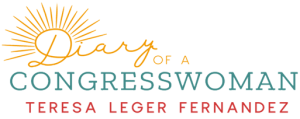Mary-Charlotte :
I wanted to ask you, because today is Mardi Gras—
Teresa Leger Fernandez:
Oh my goodness.
MCD:
—which is the last day before Lent. And of course nobody’s doing anything, whether it be New Orleans or Santa Fe, New Mexico, or anywhere else in the country, because we’re all under lockdown in one way or another. But it made me think about the question of religion and Catholicism and how your Catholicism that you grew up with is affecting you, how you’re thinking about it, how much—or not—it’s a part of your life.
TLF:
Oh, that was interesting. Cause they did send something out about Ash Wednesday and they were going to have a virtual Ash Wednesday And it’s like, well that doesn’t count because then you don’t get the, you get the ceniza.
MCD:
The Ash on your head.
TLF:
Yeah. And I think that that’s such a beautiful statement, ashes to ashes, that you’ll return to this. And so the question becomes, what will you do on your time here on earth, right. And how will you live up to creating—the kingdom of heaven needs to be created on earth as well as in heaven. And so I didn’t really learn liberation theology until I got to college. But I think that I knew a lot about people who believed in liberation theology while I was growing up, that part of our role and part of what we should be about is caring for others. So my mother, her faith, underlay a lot of her—her faith was part of the structure for her being such a giving, generous woman who believed in leaving her community a better place. The nice thing about Northern New Mexican Catholicism is we do do a little bit of highlighting what we believe in and that we don’t need to get caught up in some of the institutional stuff. So my mother, who went to mass every single day, also thought that women should be priests and that women should have a right to make decisions about their own life, whether it’s getting a divorce or what you do on your reproductive life. And yet she was a devout Catholic. And my grandmother the same thing too. And we also believe, you know, La Virgin de Guadalupe, her presence is big in our lives, it’s big in my life. So all of that Catholicism and the idea that community, that the Catholic church was so much part of what our community was around. And so it’s a big part of my life in terms of how I see the world as interconnected and based on community comes from that kind of role, that positive role that Catholicism played. You know, in New Mexico, there was a time when there were three issues before the legislature: it was repeal of the death penalty, the living wage. And civil unions. And on two out of three, the Catholic church was really good. They were really bad about the civil unions. And so I was upset with them about that, but I was really proud of the fact that it was the Catholic church that led the effort on the living wage. It was the Catholic church that led the effort on the abolishment of capital punishment. It was the Catholic church that really did a lot around immigration issues and refugees. So there’s a lot wrong with the institution and with what they’ve done in hiding abuse and lots of other things. But there are also really important elements of the church and the way it’s played out here in New Mexico and in Latin America.
MCD:
It seems like there’s two big pieces that people get involved in for themselves. One is community, as you talked about, and the other is theology, which for, I think, a lot of us is more personal and not something that we can all have in common because everybody holds their idea of God or atheism or whatever they have in a different way.
TLF:
Yeah. You know, I don’t know if you have listened to On Being.
MCD:
Yeah, Krista Tippett.
TLF:
She’s great. And the way she always asked people at the beginning of every interview, what kind of spiritual practice or influence was there in your own life. And there was somebody the other day and they went, well, you know, I wasn’t really that involved. And then they went on to mention, you know, they were a chorister, this huge involvement in the church, even as they downplayed that it wasn’t that much. So, I think for Democrats, we often don’t lead with that, because it is personal. I think a lot of Evangelicals and others lead with that. But then if you ask, are they following the sermon on the mount, they are not with their policies. So I’d prefer to not speak a lot about it, but in our actions and in our policies, be consistent with a spiritual practice that follows the sermon on the mount.
MCD:
Which basically means—
TLF:
It means you care for the poor, you take the bread and you give it to others. And you share. It’s caring for the poor. Now you could say it’s caring for the planet and caring for others. So it’s a beautiful talk about the role we should play with each other in supporting each other. And those aspects of the gospel and Jesus’s message are profound if we actually followed them.
MCD:
Thank you.


